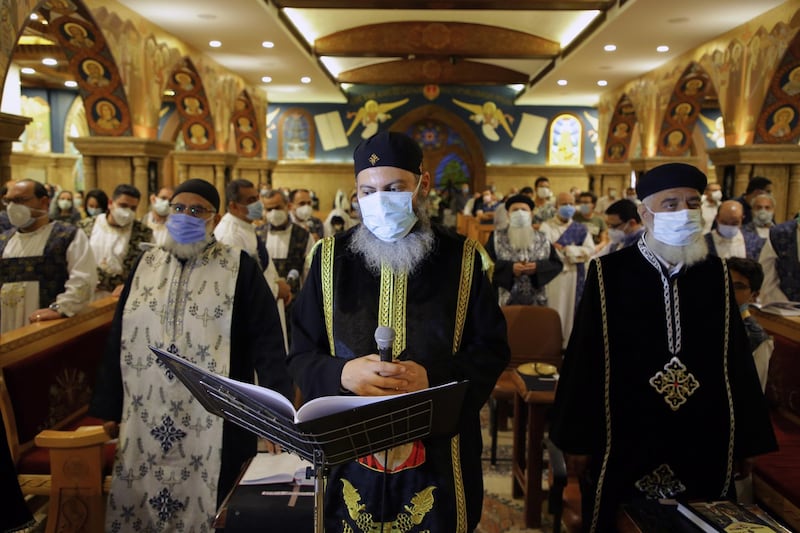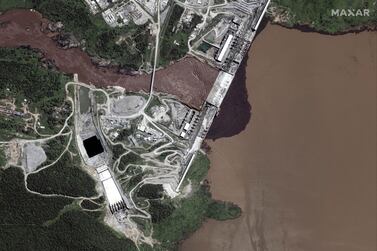The spiritual leader of Egypt’s Orthodox Christians has lent his support to the government’s efforts to resolve a dispute with Ethiopia over a dam it is building on the Blue Nile, which Cairo fears could cut its life-or-death share of the river water.
“We support the political leadership’s efforts to find a comprehensive and just solution of the water crisis; one that guarantees the divine right to life for the people of Egypt and their brothers in Sudan,” Pope Tawadros II said in a video-taped message released by the Coptic Church’s media department on the Coptic Easter holiday.
Pope Tawadros leads the Coptic Orthodox Church, whose followers make up the overwhelming majority of Egypt’s estimated 10 million Christians.
His comments on the Ethiopian dam carry added weight because of the centuries-old links between his church, which is among the world’s oldest Christian denominations, and Ethiopia’s large community of Coptic Christians.
The heads of Egyptian church had for centuries served as the spiritual leaders of Ethiopia’s Coptic Christians until 1959, when the Ethiopian church broke away but continued to accord Egypt’s Orthodox pontiffs an “honorary primacy”.
“Egypt has given life to the Nile, it has given it a meaning and a legacy driven from the civilisation of the Egyptians. No one has given the Nile like Egypt and the Egyptians have,” Pope Tawadros said in the Easter sermon.
“We pray that God grants success to all the good political and diplomatic efforts (to find a resolution) so we don’t resort to other efforts,” he said.
Downstream Egypt and Sudan have for years been seeking a legally binding deal on the operation and filling of the Grand Ethiopian Renaissance Dam, or GERD, as well as mechanisms to handle droughts and disputes.
![This handout satellite image obtained courtesy of Maxar Technologies on July 21, 2020 shows a view of northwestern Ethiopia that focuses on the status of the Grand Ethiopian Renaissance Dam (GERD) and the Blue Nile River on July 11, 2020. - This massive construction project (nearly $5 billion USD) that has been under construction since 2011 will become the largest dam in Africa and affect Sudan and Egypt as the river flows north from the dam and ultimately becomes the vitally important Nile River. The most recent satellite imagery collected on July 12, 2020 reveals that a large reservoir has started to fill behind the dam. Some estimates claim that it may take as long as 5-7 years to fill the reservoir completely. (Photo by Handout / Satellite image ©2020 Maxar Technologies / AFP) / RESTRICTED TO EDITORIAL USE - MANDATORY CREDIT "AFP PHOTO / Satellite image ©2020 Maxar Technologies " - NO MARKETING - NO ADVERTISING CAMPAIGNS - DISTRIBUTED AS A SERVICE TO CLIENTS / “The erroneous mention[s] appearing in the metadata of this photo by Handout has been modified in AFP systems in the following manner: taken July 11, 2020 instead of July 12, 2020]. Please immediately remove the erroneous mention[s] from all your online services and delete it (them) from your servers. If you have been authorized by AFP to distribute it (them) to third parties, please ensure that the same actions are carried out by them. Failure to promptly comply with these instructions will entail liability on your part for any continued or post notification usage. Therefore we thank you very much for all your attention and prompt action. We are sorry for the inconvenience this notification may cause and remain at your disposal for any further information you may require.”](https://thenational-the-national-prod.cdn.arcpublishing.com/resizer/v2/NNGQZZPCVA72JQWCAMXRZCQJMM.jpg?smart=true&auth=a196a30b64fbdcfe61ee6f6f1b7ef0e9c0879786a60b734538a0b34762320331&width=400&height=307)
Ethiopia insists guidelines should suffice and says it will go ahead with a second and much larger filling of the dam in July, regardless of whether or not an agreement is reached.
The most populous Arab nation with more than 100 million people, Egypt says its share of the river’s water is an existential issue and it would not stand idly by if denied its share of water.
Alongside its concerns over its own water supply, Sudan fears that a lack of coordination with Ethiopia on the running of the GERD could disrupt its own power-generating dams on the Nile and cause floods.








